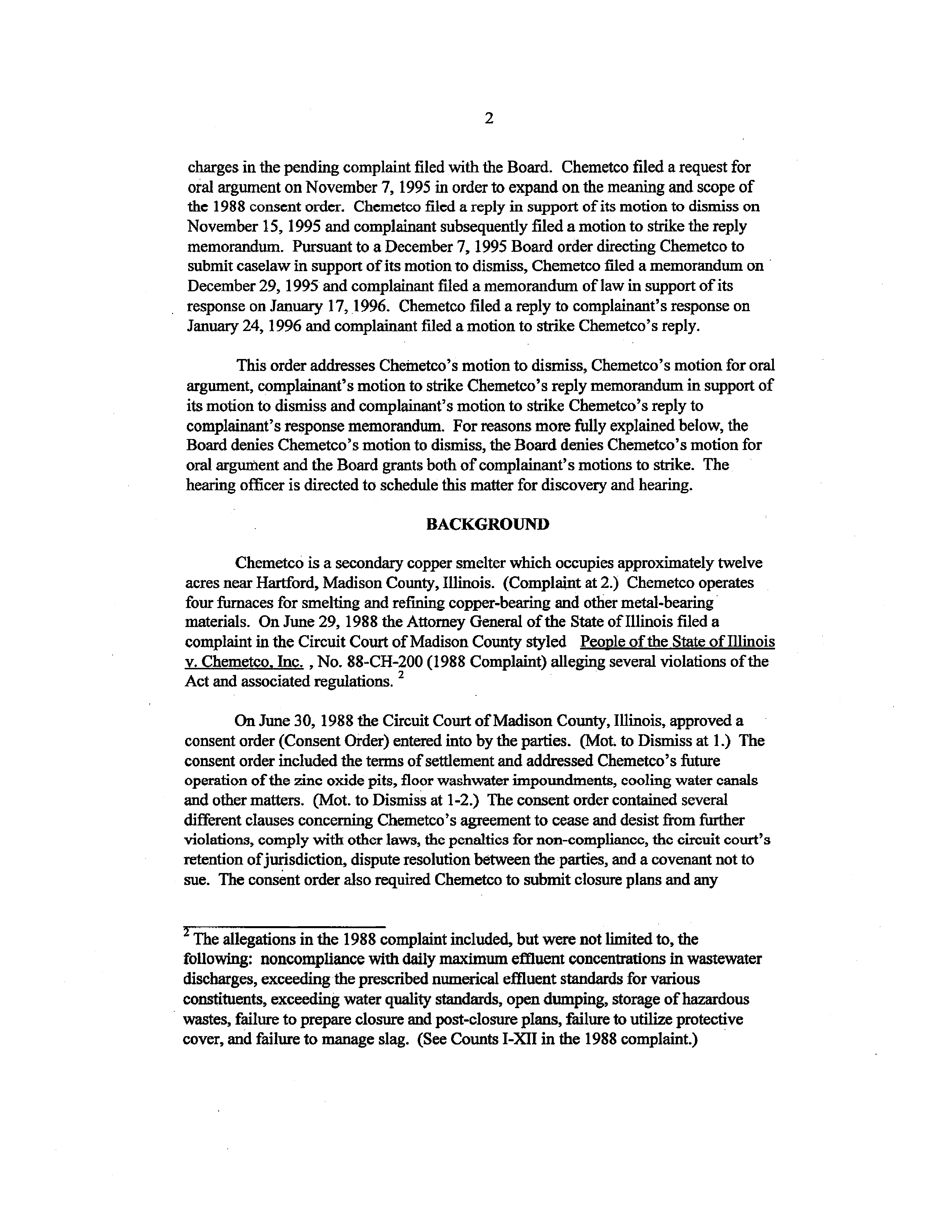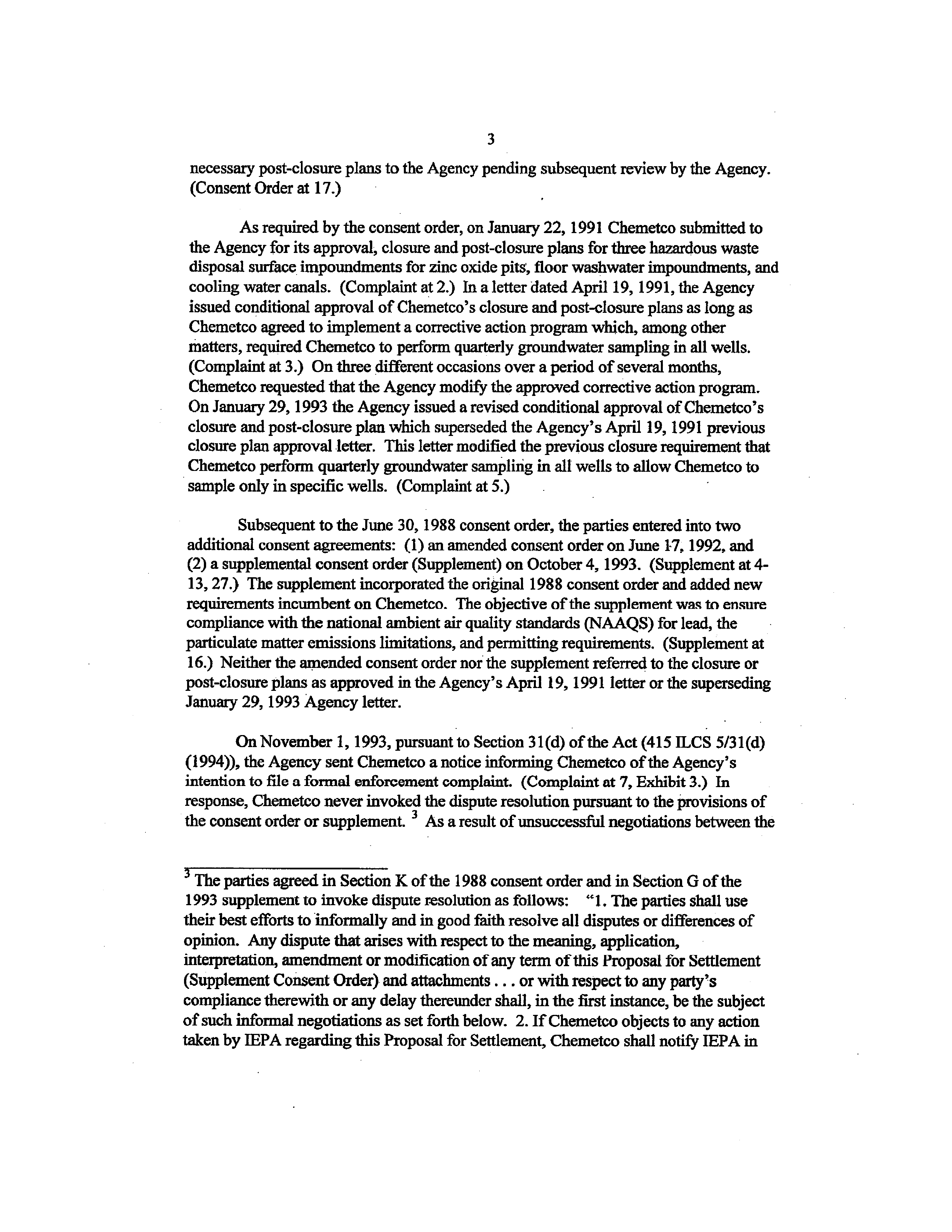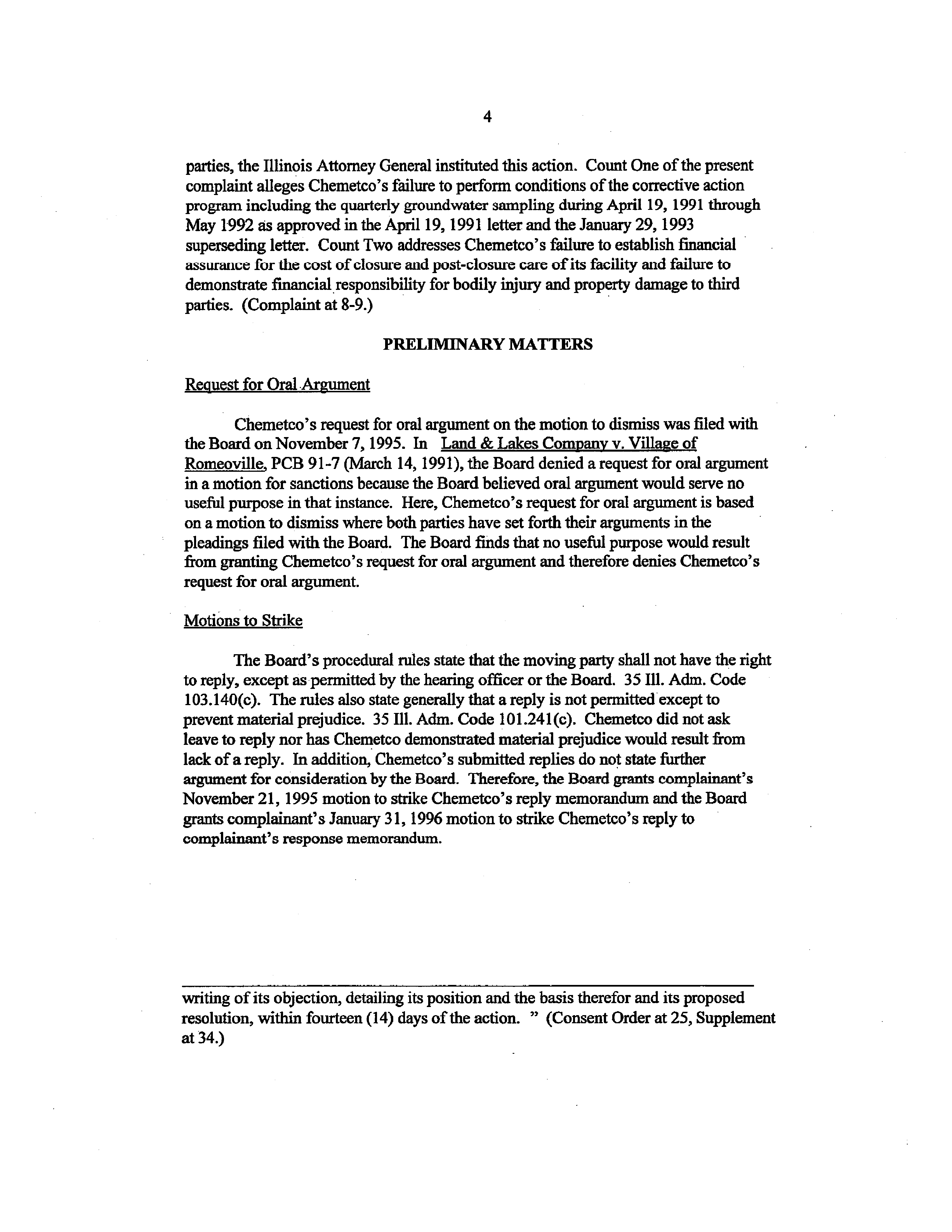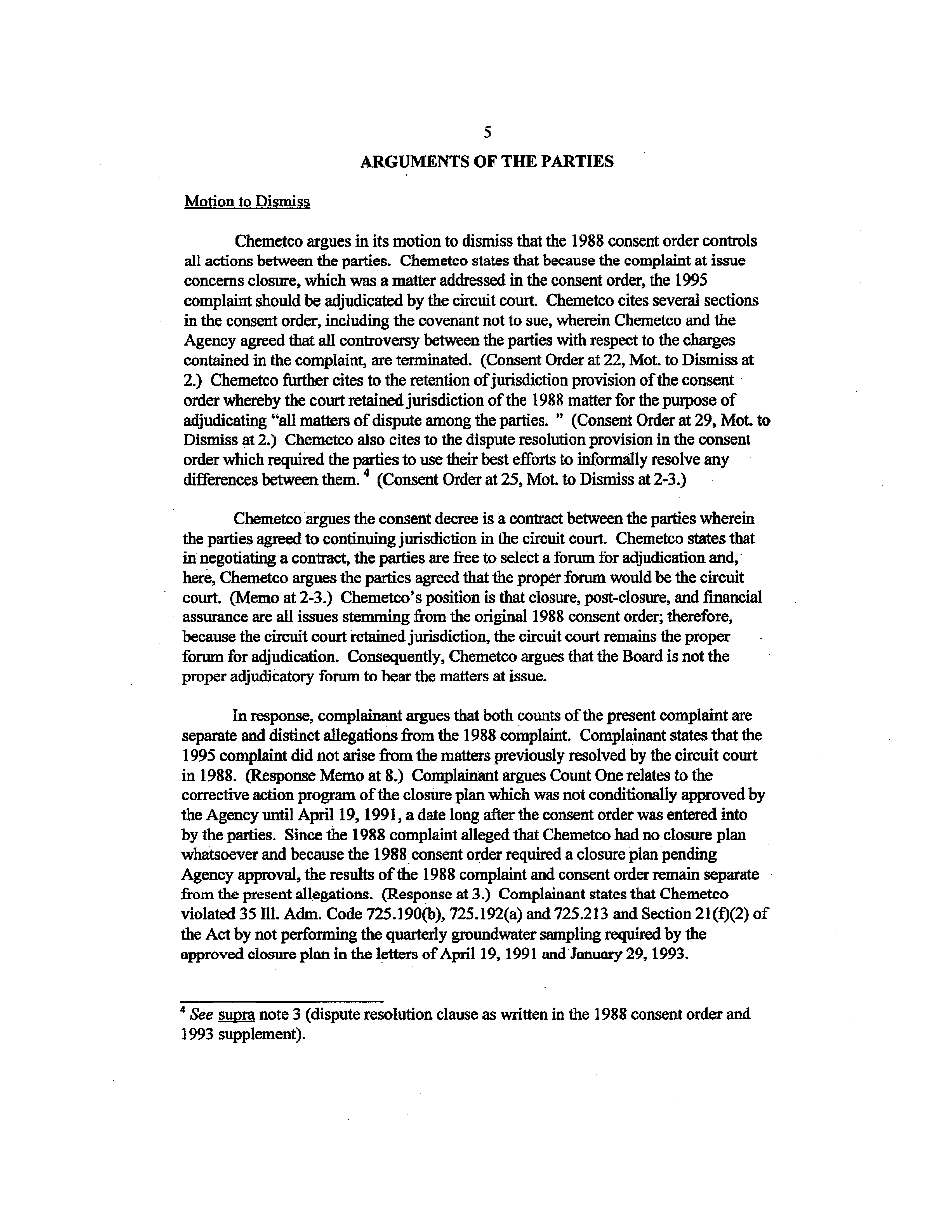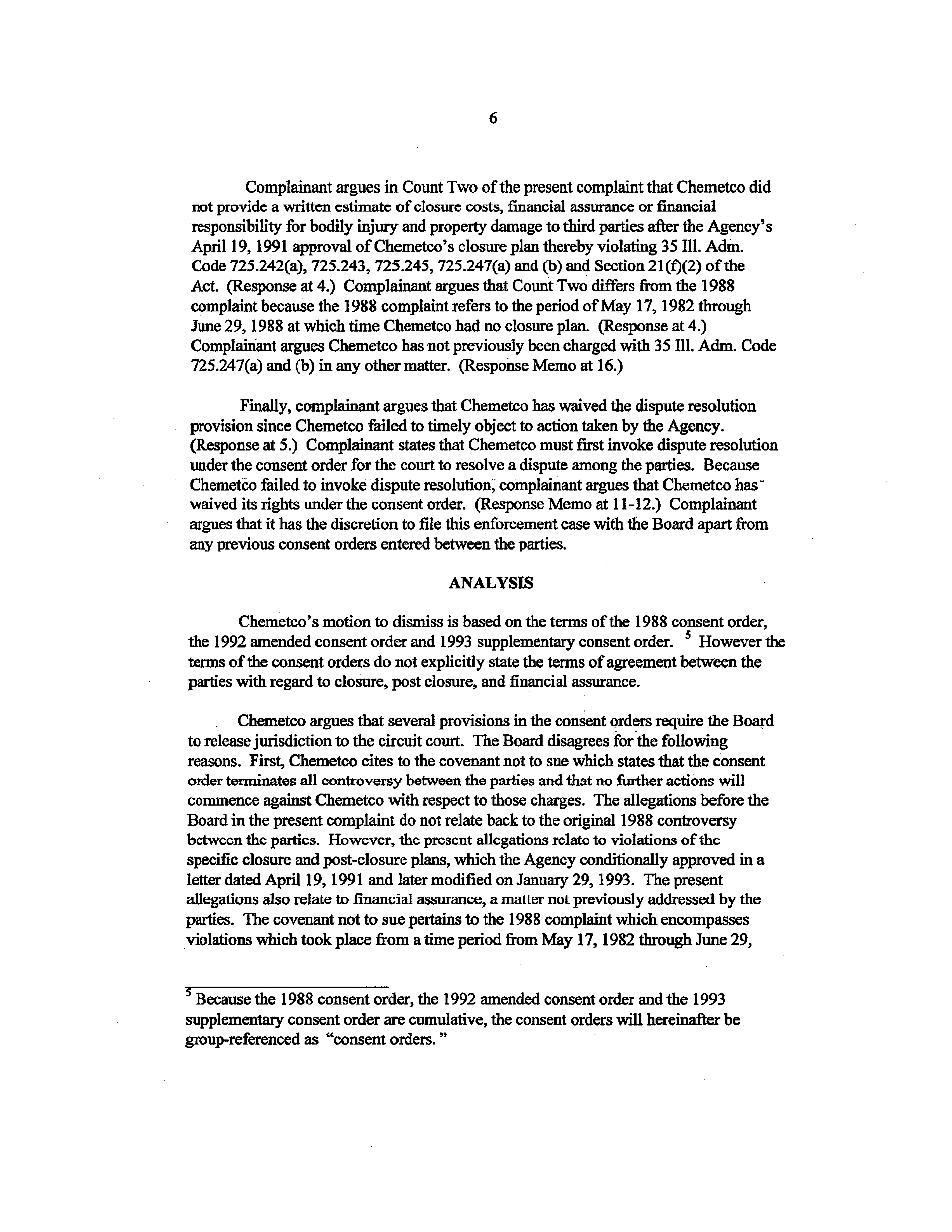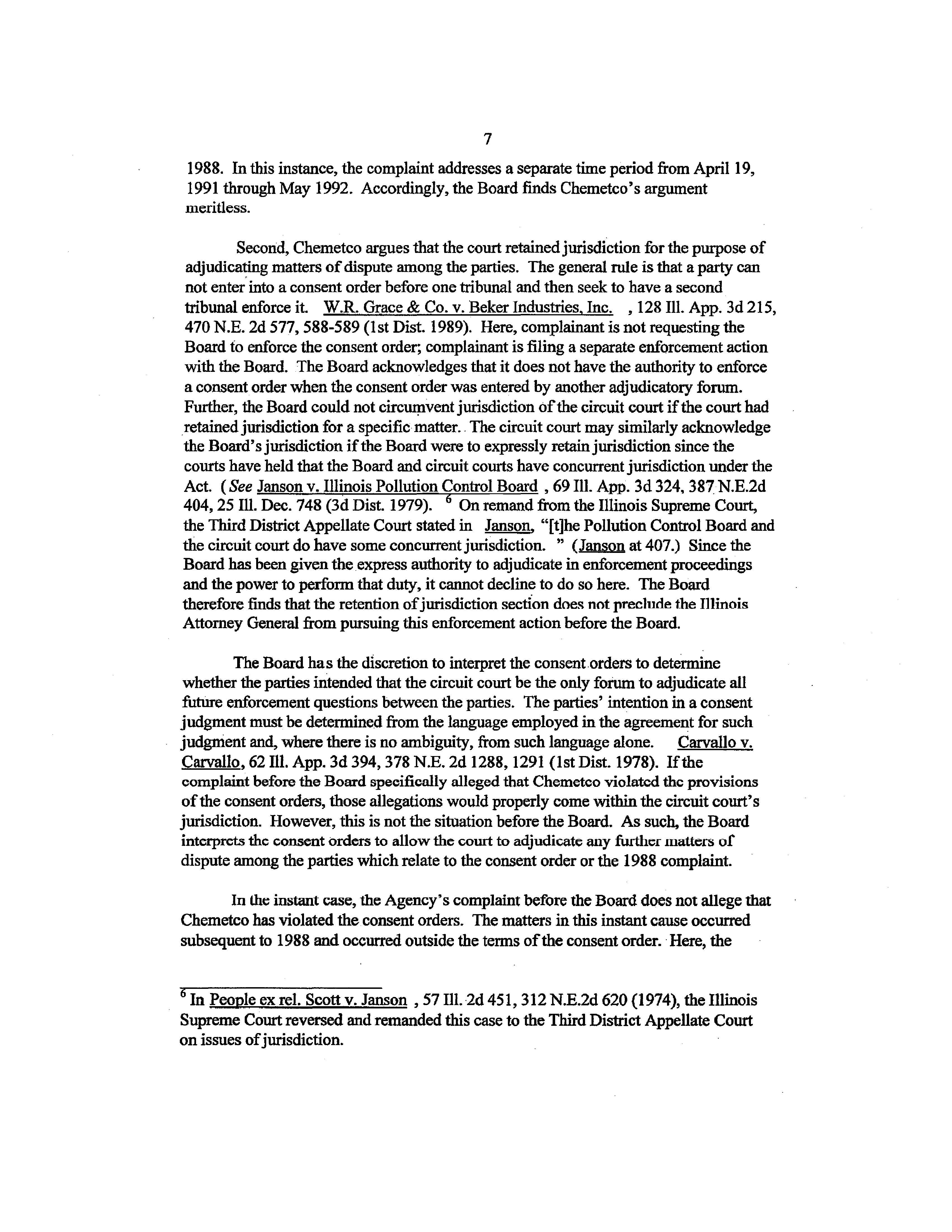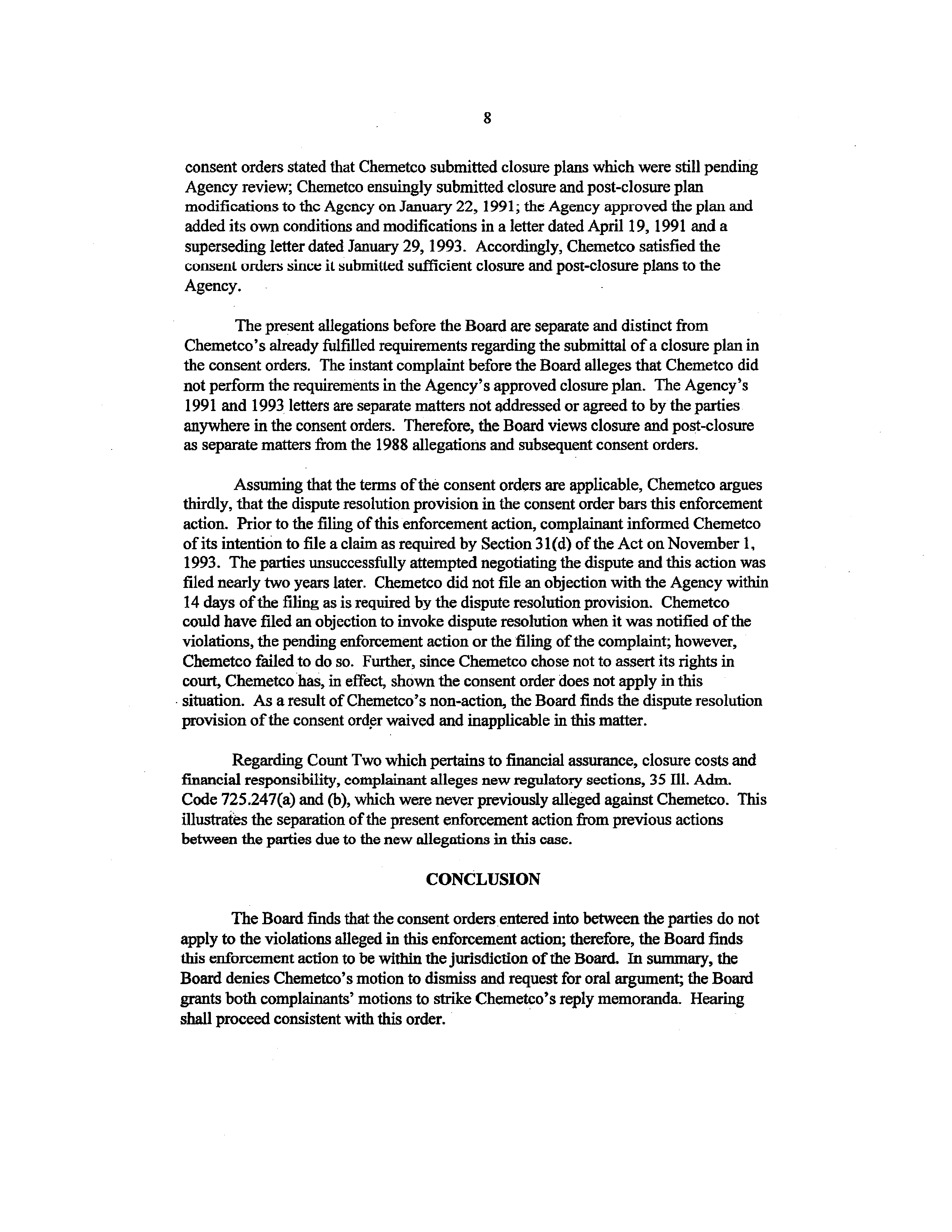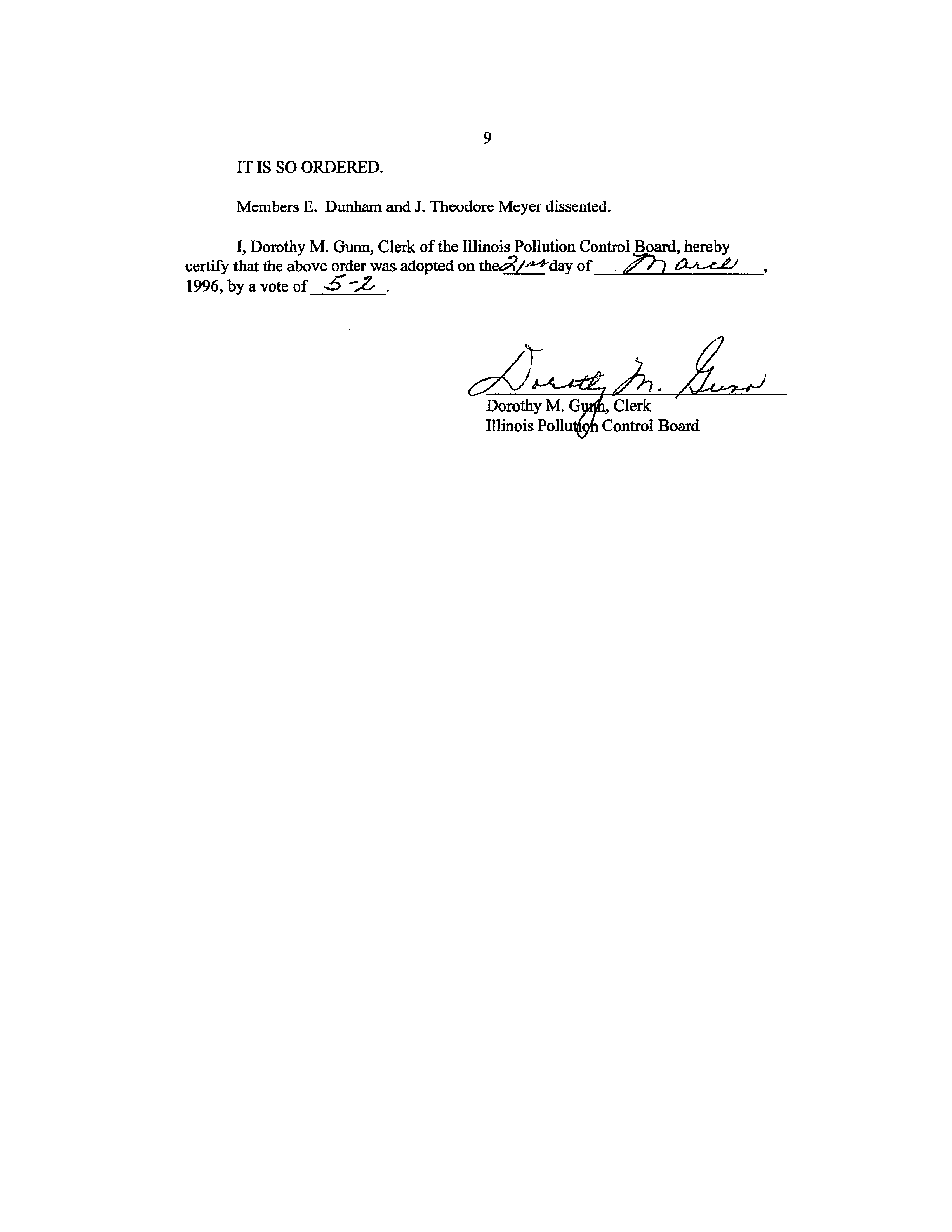ILLINOIS POLLUTION CONTROL BOARD
March21,
1996
PEOPLE OF THE
)
STATE OF ILLINOIS,
)
)
Complainant,
)
)
v.
)
PCB 96-76
)
(Enforcement
-
RCRA)
CHEMETCO,
INC.,
)
)
Respondent.
)
ORDER OF THE BOARD
(by C.A. Manning):
This matter comesbefore the Board on a motion
to dismiss filed on October 20,
1995 by respondent, Chemetco, Inc. (Chemetco), requesting that the Board dismiss the
complaint filed on October 10,
1995 by the People ofthe State ofIllinois on behalfof
the Illinois Environmental Protection Agency (Agency).
The complaint alleges
violations ofSection
2 1(0(2) ofthe Environmental Protection Act (Abt) (415 ILCS
5/21(0(2) (1994)) and 35 Ill. Adm.
Code
725.190(b),
725.192(a),
725.213,
725.175,
725.1
94(a)(2)(B),
725.242(a),
725.243, 725.245, and 725.247(a)(b) which regulate
hazardous waste, closure, post-closure and financial assurance.
In the motion to dismiss,
1
Chemetco contends that because the parties entered
into a consent order approved by the Circuit Court ofMadison County on June 30,
1988, jurisdiction over the instant complaint continues in the circuit court rather than
the Board.
On October 27,
1995 complainant filed a response to Chemetco’s motion to
dismiss arguing that the 1988 consent order does not preclude prosecution ofany ofthe
‘The 1988 complaint filed on June 29,
1988 in the Madison County Circuit Court will
be cited to as (1988 Complaint at
j.
The 1988 consentorder entered into between
the parties on June 30,
1988
will be cited to as (Consent Order at
j.
The
1993
supplementary consent order entered into between the parties on October 4,
1993 will
be cited to as (Supplement at
.).
The
1995
complaint filed on October 10,
1995
presently pending before the Board will be cited to as (Complaint at__j.
Chemetco’s
motion
to dismiss filed on October 20,
1995 will hereinafter be cited to as (Mot. to
Dismiss at
.).
Complainant’s response to the motion to dismiss filed on October
27,
1995 will be cited to as (Response at
~.
Chemetco’s memorandum in support
ofits motion to dismiss filedon December 29,
1995 will be cited to as (Memo at
j.
Complainant’s memorandum in support ofits response filed on January
17,
1996 will
be cited to as (Response Memo at
_.).
2
charges in the pending complaint filed with the Board.
Chemetco filed a request for
oral argumenton November 7,
1995 in order to expand on the meaningand scope of
the 1988 consent order.
Chemetco filed areply in support ofits motion to dismiss
on
November 15,
1995 and complainant subsequently filed amotion to strike the reply
memorandum.
Pursuant to aDecember 7, 1995 Board order directing Chemetcoto
submitcaselawin support ofits motion to dismiss, Cheinetco filed amemorandum on~
December 29,
1995
andcomplainant filed amemorandum oflaw in support of its
response on January 17,1996.
Chemetco filed areply to complainant’s response on
January 24, 1996 andcomplainant filed amotion to strike Chemetco’s reply.
This order addresses Chemetco’s motion to dismiss, Chemetco’s motion fororal
argument, complainant’s motion to strike Chemetco’s reply memorandum in support of
its motion to dismiss and complainant’s motion to strike Chemetco’s reply to
complainant’s response memorandum.
For reasons more fully explainedbelow, the
Board denies Chemetco’s motion to dismiss,the Board denies Chemetco’s motion for
oral argumentand the Board grants bothof complainant’s motions to strike.
The
hearing officer is directed to schedule this matter for discovery and hearing.
BACKGROUND
Chemetco is a secondary copper smelter which occupies approximately twelve
acres near Hartford, Madison County, Illinois.
(Complaint at2.)
Chemetco operates
four furnaces forsmelting and refming copper-bearing and othermetal-bearing
materials.
On June 29, 1988 the Attorney General ofthe State ofIllinois filed a
complaint
inthe Circuit Court ofMadison County styled
People ofthe State of Illinois
v. Chemetco. Inc.
,
No. 88-CH-200 (1988 Complaint) alleging several violations ofthe
Actand associated regulations.
2
On June 30, 1988 the Circuit Court ofMadison County, Illinois, approved a
consent order (Consent Order) entered into
by the parties.
(Mot to Dismiss at 1.)
The
consent order included the terms of settlement and addressed Chemetco’s future
operation ofthe zinc oxide pits, floor washwater impoundments, cooling water canals
and other matters.
(Mot.to Dismiss at 1-2.)
The consent order contained several
different clauses concerning Chemetco’s agreement to cease and desist from further
violations, comply with other laws, the penalties fornon-compliance, the circuit court’s
retention ofjurisdiction, disputeresolution betweenthe parties, and a covenant not to
sue.
The consent order alsorequired Chemetcoto submit closure plans and any
2
allegations in the 1988 complaint included, but were not limited to, the
following:
noncompliance with daily maximum effluent concentrations in wastewater
discharges, exceeding the prescribednumerical effluent standards forvarious
constituents, exceeding water quality standards, open dumping, storage of hazardous
wastes, failureto prepare closure andpost-closureplans, failureto utilize protective
cover, and failureto manage slag.
(See Counts I-XII in the 1988 complaint.)
3
necessarypost-closure plans to the Agency pending subsequent review by the Agency.
(Consent Order at 17.)
As required by the consent order, on January 22, 1991 Chemetco submitted to
the Agency for its approval, closureand post-closure plans for three hazardous waste
disposal surface impoundments for zinc oxide pits; floor washwater impoundments, and
cooling water canals.
(Complaint at2.)
In aletter datedApril
19, 1991, the Agency
issued conditional approval of Chemetco’s closure and post-closure plans as long as
Chemetco agreed to implement a correctiveaction program which, amongother
matters, required Chemetco to perform quarterly groundwater sampling in all wells.
(Complaint at 3.)
On three different occasions overaperiod of several months,
Chemetcorequested that the Agency modifythe approvedcorrective action program.
On January 29,1993 the Agency issued arevisedconditional approval ofChemetco’s
closure andpost-closureplan which superseded the Agency’s April 19, 1991 previous
closureplan approval letter.
This letter modified the previous closure requirement that
Chemetco perform quarterly groundwater samplirig in all wells to allow Chemeteo to
sample only in specific wells.
(Complaint at
5.)
Subsequent to the June 30, 1988 consent order, the parties entered into two
additional consent agreements:
(1) an amended consent order on June
1-7, 1992, and
(2)a supplemental consent order (Supplement) on October 4, 1993.
(Supplement at 4-
13, 27.)
The supplement incorporated the original
1988 consent order and added new
requirements incumbent on Chemetco.
The objective ofthe supplement was to ensure
compliance with the national ambient air quality standards (NAAQS) forlead, the
particulate matter emissions limitations, andpermittingrequirements.
(Supplement at
16.)
Neitherthe amended consent order nor the supplement referredto the closure or
post-closure plans as approved in the Agency’s April
19, 1991 letter or the superseding
January 29, 1993 Agency letter.
On November 1, 1993, pursuant to Section 31(d) of the Act
(415
ILCS 5/31(d)
(1994)), the Agency sent Chemetco a noticeinforming Chemetco of the Agency’s
intention to filea formal enforcement complaint.
(Complaint at 7, Exhibit 3.)
In
response, Chemetco never invoked the dispute resolution pursuant to the provisions of
the consent order or supplement.
~ As aresult ofunsuccessful negotiationsbetween the
~
parties agreed in Section K ofthe 1988 consent order and in Section G ofthe
1993 supplementto invokedispute resolution as follows:
“1. The panics shalluse
their besteffortsto informally andin good faith resolve all disputes or differencesof
opinion.
Any dispute that arises with respect to the meaning, application,
interpretation, amendment or modification ofanyterm of this Proposal for Settlement
(Supplement Consent Order) and attachments..
.
or with respect to any party!s
compliancetherewith or anydelay thereunder shall,in the firstinstance, be the subject
of such informal negotiationsas set forth below.
2. If Chemetco objects to any action
taken by IEPA regarding this Proposal for Settlement, Chemetco shallnoti& IEPA in
4
parties, the Illinois Attorney General instituted this action.
Count One ofthe present
complaint alleges Chemeteo’s failure to perform conditions ofthe correctiveaction
program including the quarterly groundwater sampling during April 19, 1991 through
May 1992 as approved in the April 19, 1991 letter and the January 29, 1993
superseding letter.
Count Two addresses Chemetco’s failure to establish fmancial
assurance forthe cost of closure andpost-closure care of its facility and failure to
demonstrate financial responsibilityfor bodily injury and property damage to third
parties.
(Complaint at 8-9.)
PRELIMINARY MATTERS
Request for Oral Argument
Chemetco’s requestfor oral argument on the motion to dismiss was filed with
the Board on November 7, 1995.
In
Land & Lakes Comvanvv. Village of
Romeoville, PCB 91-7 (March
14,
1991), the Board denied a requestfor oral argument
in amotion for sanctionsbecause the Board believed oral argumentwould serve no
useful purpose in that instance.
Here, Chemetco’s requestfor oral argument is based
on a motion to dismiss where both parties have set forth their arguments in the
pleadings filed with the Board.
The Board finds that no useful purpose would result
from granting Chemetco’s requestfor oral argument andtherefore denies Chemetco’s
request for oral argument.
Motions to Strike
The Board’s procedural rules state that the moving party shallnot have the right
to reply, exceptaspermitted by the hearing officer or the Board.
35111. Adm. Code
103.140(c).
The rules also state generallythat areply is not permitted exceptto
preventmaterial prejudice.
35 Ill. Adm. Code 101.241(c).
Chemetco did not ask
leave to reply norhas Chernetco demonstrated material prejudice would result from
lack of areply.
In addition, Chemetco’s submitted replies do not state further
argumentfor consideration by the Board.
Therefore, the Board grants complainant’s
November 21,
1995 motion to strike Chemetco’s reply memorandum andthe Board
grantscomplainant’s January 31, 1996 motion to strike Chemetco’s reply to
complainant’s response memorandum.
writing of its objection, detailing its position and the basis therefor and its proposed
resolution, within fourteen (14) days ofthe action.
“
(ConsentOrder at
25,
Supplement
at34.)
5
ARGUMENTS OF TIlE PARTIES
Motion to Dismiss
Chemetcoargues in its motiOn to dismiss that the 1988 consent order controls
all actions between the parties.
Chemeteo states that because the complaint at issue
concerns closure, which was amatter addressed in the consent order, the 1995
complaint should be adjudicated by the circuit
court.
Chemetcocites several sections
in the consent order, including the covenantnot to sue, wherein Chemetco andthe
Agency agreed that all controversy between the parties with respectto the charges
contained in the complaint, are terminated.
(Consent Order at 22, Mot. to Dismiss at
2.)
Chemetco further cites to the retention ofjurisdictioñ provision ofthe consent•
order wherebythe court retained jurisdiction of the
1988 matter forthe purpose of
adjudicating “all matters of dispute among the parties.
“
(Consent Order at29, Mot. to
Dismiss at2.)
Chemetco also ekes to the dispute resolution provision in the consent
order which required the parties to use their best effortsto informally resolve any
differences betweenthem.
~‘
(Consent Order at 25, Mot. to Dismiss at2-3.)
Chemeteo arguesthe consent decree is a contract betweenthe parties wherein
the parties agreed to continuingjurisdiction in the circuit court.
Chemetco states that
in negotiating a contract, the parties are free to select aforum for adjudication and,
here,Chemetco argues the parties agreed that the properforumwould be the circuit
court.
(Memo at 2-3.)
Chemeteo’s position is that closure, post-closure, andfinancial
assurance are all issues stemming from the original
1988 consent order; therefore,
because the circuit court retainedjurisdiction, the circuit court remains the proper
forum foradjudication.
Consequently, Chemeteo argues that the Board is not the
proper adjudicatory forum to hear the matters at issue.
In response, complainant argues that both counts of the present complaint are
separate and distinct allegations from the 1988 complaint.
Complainant states that the
1995 complaint did not arise from the matters previously resolved by the circuit court
in 1988.
(Response Memo at 8.)
Complainant argues Count One relates to the
corrective actionprogram of the closure planwhichwas not conditionally approvedby
the Agenëy until April 19, 1991, a date long after the consent order was entered into
by the parties.
Since the 1988 complaint allegedthat Chemetco hadno closure plan
whatsoever and because the
1 988 consent order required aclosure planpending
Agency approval, the results of the 1988 complaint and consent order remain separate
from the present allegations.
(Response at 3.)
Complainant
states
that Chemetco
violated 35
Ill. Adm. Code 725.190(b), 725.192(a) and 725.213 and Section 21(f)(2)of
the Act by not performing the quarterly groundwater sampling requiredby the
approvedclosure
plan
in the letters ofApril
19, 1991
and
January 29, 1993.
4See
supranote 3 (dispute resolution clause as written in the 1988 consent order
and
1993
supplement).
6
Complainant argues in Count Two ofthe present complaint that Chemeteo did
not provide awritten
estimate
of closurecosts, financial assurance or financial
responsibility forbodily injury andproperty damage tothirdparties after the Agency’s
April 19, 1991
approval of Chemeteo’s closureplan therebyviolating 35 Ill. Adfn.
Code
725.242(a), 725.243, 725.245,
725.247(a) and (b) and Section 21(0(2) of the
Act.
(Response at 4.)
Complainantarguesthat Count Two differs from the 1988
complaint because the 1988 complaint refers to the period of May
17, 1982 through
June 29, 1988 at whichtime Chemetco had no closureplan.
(Response at 4.)
Complainant argues Chemetco hasnot previously beencharged with 35111. Adm. Code
725.247(a)
and (b) in any other matter.
(Response Memo at 16.)
Finally, complainant arguesthat Chemetco has waivedthe disputeresolution
provision since Chemeteo failed to timely objectto actiontaken by the Agency.
(Response at
5.)
Complainant states that Chemetco must first invoke dispute resolution
under the consent order forthe court to resolve a dispute among the parties.
Because
Chemetào failed to invoke dispute resolution; complainant argues that Chemetco bas
waived its rights under the consent order.
(Response Memo at 11-12.)
Complainant
argues that it has the discretion to filethis enforcementcase with the Board apartfrom
anypreviousconsent orders entered between the parties.
ANALYSIS
Chemetco’s motion to dismiss is based on the terms of the 1988 consent order,
the 1992 amended consent order and 1993 supplementary consent order.
~ However the
terms of the consent orders do not explicitly state the terms ofagreement betweenthe
parties with regard to closure, post closure, and
fmancial assurance.
Chemetco argues
that several provisions in the consent?rders require the Board
to release jurisdiction to the circuit court.
The Boarddisagrees forthe following
reasons.
First, Chemeteo cites to the covenantnot to sue whichstates that the consent
order terminates all
eontroversy
between the parties and that no further actions will
commence against Chemetco
with
respect to those charges.
The allegations before the
Board in the presentcomplaint do not relate backto the original
1988 controversy
bctweenthe parties.
However, the present allegations relate to violations of the
specific closure andpost-closureplans, whichthe Agency conditionally approved in a
letter dated April 19,
1991 and later modified on January 29, 1993.
The present
allegations
also
relate to
financial
assurance, amatter nut previously addressed by the
parties.
The covenantnot to suepertainsto the 1988 complaint which encompasses
violations which took place from atime period from May
17, 1982 through June 29,
~Because the 1988 consent order, the 1992 amended consent order andthe 1993
supplementary consent order are cumulative, the consent orders will hereinafter be
group-referenced
as
“consent orders.”
7
1988.
In this
instance, the
complaint addresses a separate time period from April 19,
1991
through May 1992.
Accordingly, the Board
finds
Chemetco’s argument
meritless.
Second, Chemetco arguesthat the court retained jurisdiction forthe purposeof
adjudicating matters of disputeamong the parties.
The general rule is that aparty can
not enterinto a consent order before onetribunal andthen seek to have asecond
tribunal enforce it.
W.R. Grace & Co. v. Beker Industries, Inc.
,
128 Ill. App. 3d 215,
470 N.E. 2d 577, 588-589 (1st Dist.
1989).
Here, complainant is not requestingthe
Board to enforce the consent order; complainant is filing aseparate enforcementaction
with the Board.
The Board acknowledges that it does not have the authority to enforce
aconsent order whenthe consent order was entered by another adjudicatory forum.
Further, the Boardcould not circumvent jurisdiction ofthe circuit courtifthe court had
retained jurisdiction fora specific matter.. The circuit court may
similarly acknowledge
the Board’sjurisdiction ifthe Board were to expressly retain jurisdiction since the
courts haveheld that the Board and circuit courts have concurrent jurisdiction under the
Act.
(See
Janson v. Illinois Pollution Control Board
,
69111. App. 3d 324, 387 N.E.2d
404,25
Ill. Dec. 748 (3d Dist.
1979).
6
On remand from the Illinois Supreme Court,
the Third District Appellate Court statedin
Janson,
“~the Pollution Control Board and
the circuit court do have some concurrent jurisdiction.
“
(Janson at407.)
Since the
Board
has
been given the express authorityto adjudicate in enforcementproceedings
and the power to perform that duty, it cannot declineto do so here.
The Board
therefore fmds that the retention ofjurisdiction section does not precludethe Illinois
Attorney General from pursuing this enforcement action before the Board.
The Board has the discretion to interpret the consent.orders to determine
whether the parties intended that the circuit court be the only foEum to adjudicate all
future enforcement questions betweenthe parties.
The parties’ intention in a consent
judgment must be determined from the language employed in the agreement for such
judgment and, wherethere is no ambiguity, from such language alone.
Carvallo v.
Carvallo, 62 Ill. App. 3d 394, 378 N.E. 2d
1288, 1291
(1st Dist.
1978).
Ifthe
complaint before the Board specificallyalleged that Chcmctco violated the provisions
ofthe consent orders, those allegations would properly come within the circuit court’s
jurisdiction.
However, this is not the situation before the Board.
As such,the Board
interprets the consent orders to allow the
court to
adjudicate
any
further matters of
disputeamong the parties whichrelate to the consent order or the 1988 complaint.
In the instant case, the Agency’s complaint before the Boarddoes not allege that
Chemetco
has
violated the consent orders.
The matters in
this
instant cause occurred
subsequent to 1988 and occurred outside the terms ofthe consent order.
Here, the
61n People cx rd. Scott v. Janson
,
57111. 2d 451, 312 N.E.2d 620 (1974), the Illinois
Supreme Court reversed andremanded this case to the Third District AppellateCourt
on issues ofjurisdiction.
8
consent orders statedthat Chemetco submitted closureplans whichwere still pending
Agency review; Chemetco ensuingly submitted closureand post-closure plan
modifications to thc Agency on January 22, 1991; the Agency approved the planand
added its own conditions andmodifications in aletter datedApril 19,
1991 and a
superseding letter dated January 29, 1993.
Accordingly, Chemetco satisfied the
consent orders since it submitted sufficient closure and post-closureplans to the
Agency.
The present allegations before the Board are separate and distinct from
Chemetco’s already fulfilled requirements regarding the submittal of aclosure plan in
the consent orders.
The instant complaint before the Boardallegesthat Chemetco did
not perform the requirements in the Agency’s approvedclosureplan.
The
Agency’s
1991 and
1993 letters are separate matters riot addressed or agreed to by the parties
anywhere in the consent orders.
Therefore, the Boardviews closure and post-closure
as separate matters from the 1988 allegations and subsequent consent orders.
Assuming that the terms ofthe consent ordcrs are applicable, Chemetco argues
thirdly, that the dispute resolution provision in the consent order bars this enforcement
action.
Prior to the filing ofthisenforcement action, complainant informed Chemetco
ofits intention to file a claim as required by Section 31(d) of the Act on November 1,
1993.
The parties unsuccessfully attempted negotiating the dispute and thisaction was
filed nearly two years later.
Chemetco did not file an objection with the Agency within
14 days ofthe filing as is required by the disputeresolution provision.
Chemetco
could have filed an objection to invoke dispute resolution when it was notified ofthe
violations, the pending enforcement actionor the filing ofthe complaint; however,
Chemetco failed to do so.
Further, since Chemetco chose not to assert its rights in
court, Chemeteo has, in effect,
shownthe consent orderdoes not apply in this
• situation.
As aresult of Chemetco’s non-action, the Board finds the dispute resolution
provision of the consent ordprwaived and inapplicable inthis matter.
Regarding CountTwo which pertainsto financial assurance, closure costs and
financial responsibility, complainant alleges
new
regulatory
sections, 35
111.
Adm.
Code 725 .247(a) and (b), which were never previously alleged against Chemetco.
This
illustrates the separation ofthe present enforcement action from previous actions
between the parties due to the new
allegations in
this case.
CONCLUSION
The Board finds that the consent orders entered into between the parties do not
apply to the violations allegedin thisenforcement action;therefore, the Board finds
this
enforcement actionto be within the jurisdliction of the Board.
In summary, the
Board denies Chemetco’s motion to dismiss and request fororal argument; the Board
grants both complainants’ motions to strike Chemetco’s reply memoranda.
Hearing
shall proceedconsistent with thisorder.
9
IT IS SO ORDERED.
Members 13.
Dunham and
J. Theodore Meyer dissented.
I, Dorothy M.
(iunn, Clerk of the Illinois Pollution Control Board, hereby
certify that the above order was adopted on ~
of
•
)~‘~)
&-&-.cZ’
1996, by avote of
-.6~2.
~
et
Dorothy M. GyrØi, Clerk
Illinois Polluth ControlBoard


